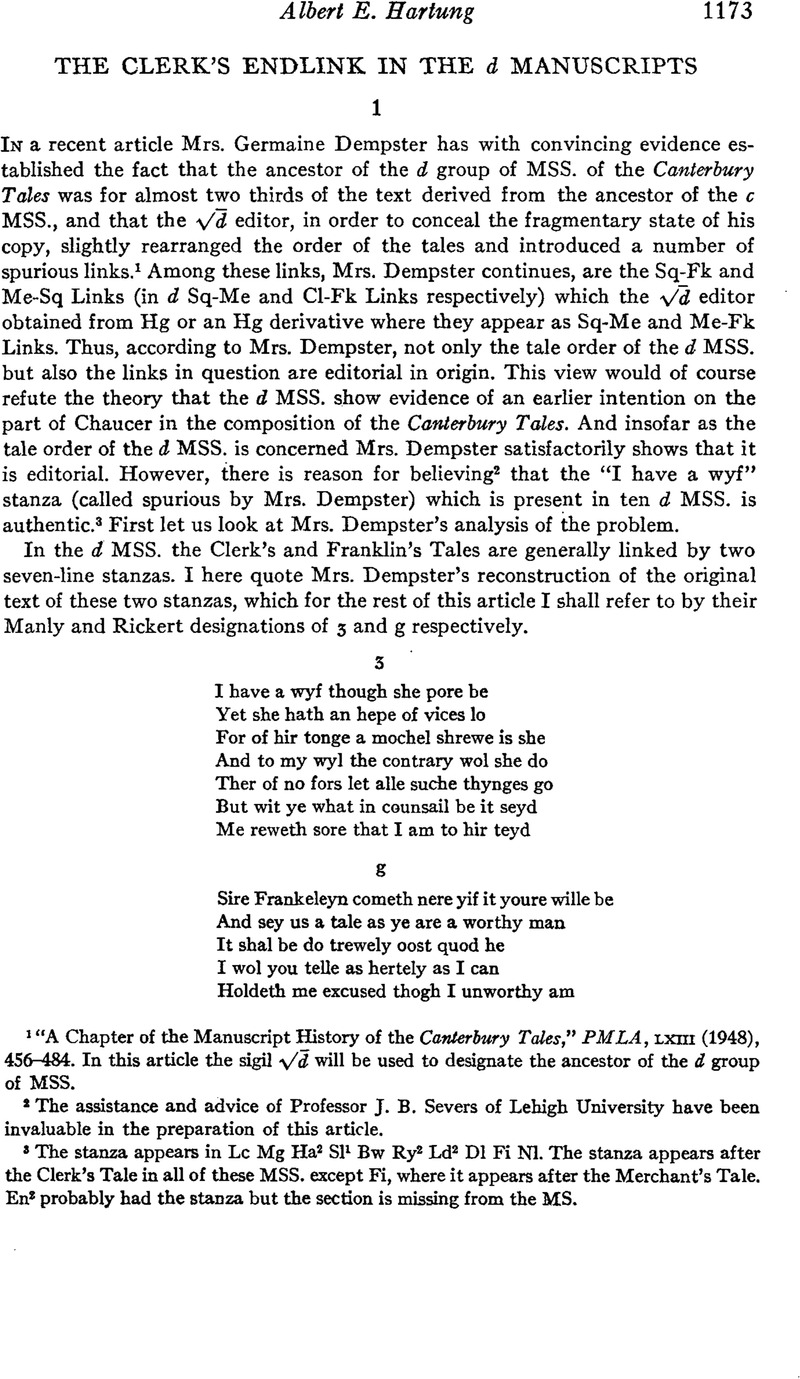No CrossRef data available.
Article contents
The Clerk's Endlink in the d Manuscripts
Published online by Cambridge University Press: 02 December 2020
Abstract

- Type
- Notes, Documents, and Critical Comment
- Information
- Copyright
- Copyright © Modern Language Association of America, 1952
References
page 1173 note 1 “A Chapter of the Manuscript History of the Canterbury Tales,” PMLA, lxiii (1948), 456-484. In this article the sigil ![]() will be used to designate the ancestor of the d group of MSS.
will be used to designate the ancestor of the d group of MSS.
page 1173 note 2 The assistance and advice of Professor J. B. Severs of Lehigh University have been invaluable in the preparation of this article.
page 1173 note 3 The stanza appears in Lc Mg Ha2 Sl1 Bw Ry2 Ld2 Dl Fi Nl. The stanza appears after the Clerk's Tale in all of these MSS. except Fi, where it appears after the Merchant's Tale. En2 probably had the stanza but the section is missing from the MS.
page 1173 note 4 “Three Notes on the Text of the Canterbury Tales,” MLN, lvi (1941), 163-175, and “Author's Revision in the Canterbury Tales,” TULA, lvii (1942), 29-50.
page 1173 note 5 The same situation exists by contamination in Ha2. Concerning Bw Manly and Rickert state, “Bw is a late and careless copy of the upper d type …. When Bw and Ry2 are together they are usually above d” (MR, i, 56).
page 1177 note 1 See Carleton Brown, “The Evolution of the Canterbury ‘Marriage Group’,” PMLA, xlviii (1933), 1041-59; review of Manly and Rickert, MLN, lv (1940), 606-621; “Three Notes on the Text of the Canterbury Tales,” MLN, lvi (1941), 163-175; “Author's Revision in the Canterbury Tales,” PMLA, lvii (1942), 29-50.
page 1177 note 2 The real puzzle both in 3 and in the Me-Sq Link is why the prosperous Host should refer to his wife as poor. Tatlock went so far as to translate “a wife as true as steel … though she be otherwise a poor one,” an interpretation for which I find no support in the Concordance. Tatlock and MacKaye, The Complete Poetical Works of Geoffrey Chaucer (New York, 1923), p. 238.
page 1177 note 3 E.g., A 2827-28:
page 1177 note 4 At random I refer to D 885-886, E 2045-46, F 17-18, G 533-534, or, in the very pieces under consideration, E 2420, 2422-23, Host St. 1-2.
page 1177 note 5 I leave out a few remarks based mostly on the assumption that the procedure of the ![]() editor as described here and there in my former articles should be exactly the same all through.
editor as described here and there in my former articles should be exactly the same all through.
page 1177 note 6 In F 4, “ ‘Nay Sire,’ quod he, ‘but I wol seye as I can’,” Pw omit but; stanza g having nothing corresponding to the “Nay Sire” protest, there is no occasion for the but. F 7, “if I speke amys,” reads in Pw “if I sai amys” and in stanza g “if I unworthy am.”
page 1177 note 7 The splitting of the link in Ln, a makeshift of the scribe (Manly and Rickert, i, 334) suggests no antecedent and, in view of the warning notes in the margins, could hardly have been imitated.
page 1177 note 8 The Cl-Fk Link opens with the Host Stanza in Ry2, Bw, and Ha2 only; in all other MSS. it consists of only 3 and g.
page 1177 note 9 Mr. Hartung's suggestion that 3 was cancelled by Chaucer raises several questions. Would not the Host Stanza have been cancelled for the same reason and at the same time? If so, isn't it strange that the scribes of two or more head MSS. should independently of one another find the Host Stanza and not find 3, and equally strange that ![]() , in this single instance, should be the sole transmitter of an authentic piece?
, in this single instance, should be the sole transmitter of an authentic piece?
page 1177 note 10 In HF 957 and Boe IV, Prose 4, “mochel” is a variant rejected by Robinson; the one instance in RR (3117) is in Section B, thus not by Chaucer.
page 1177 note 11 The piece on which Mr. Hartung's theory is based is of course a postulate.




